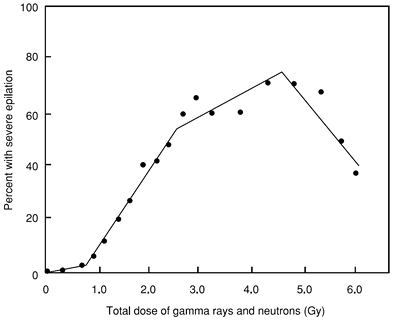Acute Radiation Syndrome
Illnesses collectively called “acute radiation syndrome” occur within a few hours to months after exposure to high-dose radiation (from approximately 1-2 Gy to 10 Gy). The principal signs and symptoms include vomiting within a few hours, followed within days to weeks by diarrhea, reduced blood cell counts, bleeding, hair loss (epilation), and temporary male sterility. Diarrhea results from damage to cells lining the intestines, reduction in blood cells from death of hematopoietic stem cells in bone marrow, and bleeding from declining blood platelets generated from such stem cells. Hair is lost due to damage to hair-root cells. Hairs do not fall out but rather become thinner and eventually break off. Sterility occurs in men from damage to sperm-generating stem cells.
Except for vomiting, these signs and symptoms are closely related to frequency of cell division, rapid cell division being more sensitive to radiation than slow division (e.g., muscle and nerve cells). If the radiation dose is low, the syndrome will seldom if ever occur. Conversely, if the dose is high, death can occur within 10 to 20 days after exposure due to severe intestinal damage, or subsequently within one or two months, mostly from bone marrow failure.
The Figure shows the relation of severe epilation (loss of more than 2/3 of scalp hair) to radiation dose. Although there is only a small effect up to 1 Gy, epilation increases sharply with dose thereafter. (Above 5 Gy, the declining frequency probably reflects overestimation of dose.)


